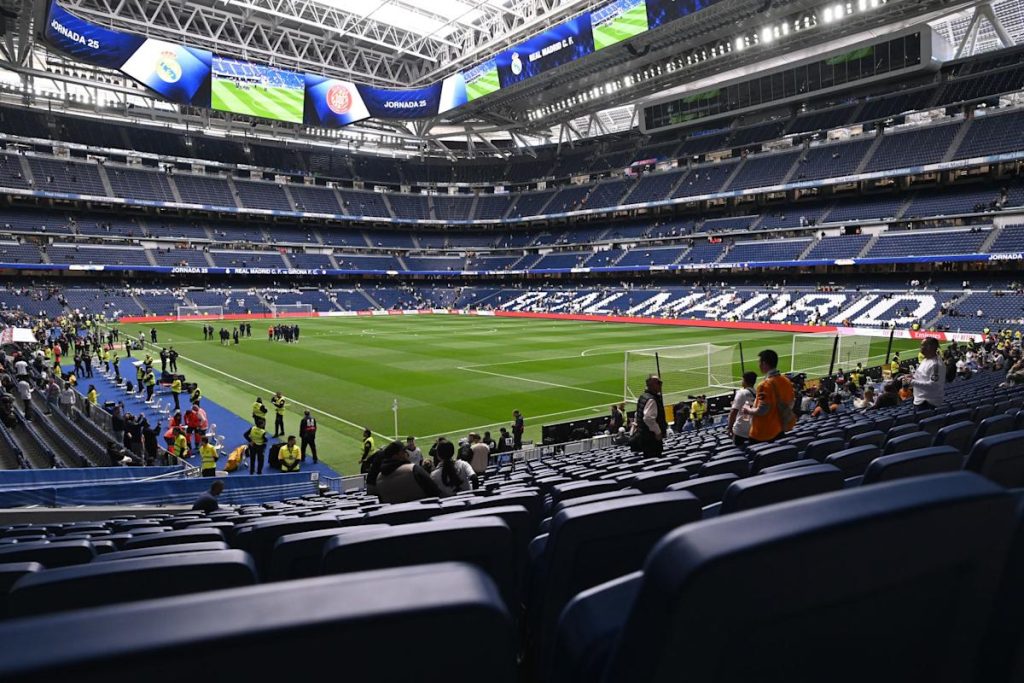Real Madrid Faces Sanctions for Discriminatory Behavior
European football’s governing body, UEFA, has handed down a significant punishment to Real Madrid in response to discriminatory behavior from a section of their supporters during their Champions League match against Manchester City. According to a report from MARCA, UEFA’s appeals body has decided to impose a partial stadium closure at the iconic Santiago Bernabeu, which will be enforced under a two-year probation period. This decision underscores UEFA’s commitment to maintaining high standards of conduct and respect within the sport.
Details of the Sanction
The sanction, based on Article 14 (2) of UEFA’s Disciplinary Regulations, mandates that Real Madrid must close at least 500 seats for their next home match in a European competition. This partial closure is a clear indication of UEFA’s intent to deter any future incidents of discriminatory behavior. Additionally, the club has been fined €30,000 due to the offensive chants directed at Manchester City’s manager, Pep Guardiola. These chants, which occurred during the second leg of the round of 16, were deemed unacceptable under UEFA’s strict regulations against discriminatory behavior.
The Incident and Its Impact
The incident in question took place during a crucial match where Real Madrid secured a 3-1 victory over Manchester City, confirming their progression to the next stage of the Champions League. Despite the on-field success, the off-field behavior of some Real Madrid supporters cast a shadow over the victory. The chants targeted Guardiola, a respected figure in world football, and were particularly egregious. UEFA, in line with Article 26, paragraph 3, of its Disciplinary Regulations, moved swiftly to address the issue, ensuring that the club and its supporters understand the gravity of their actions.
Probation Period and Future Implications
UEFA has specified that the disciplinary measures will not be immediately enforced but will come into effect if a similar incident occurs during the two-year probation period. The UEFA Appeals Committee, which has jurisdiction over urgent disciplinary matters, was responsible for making the final ruling on the case. This approach gives Real Madrid a chance to demonstrate their commitment to improving fan behavior and maintaining a respectful atmosphere at the Santiago Bernabeu. However, any recurrence of such behavior during the probation period could result in harsher penalties, potentially affecting the club’s ability to host European fixtures at full capacity.
Addressing the Root of the Problem
While the partial stadium closure and fine are relatively limited in scope, they serve as a stark warning to the club and its supporters. Real Madrid must now take proactive steps to prevent similar incidents in the future. This includes enhancing fan education programs, tightening security measures, and fostering a culture of respect and inclusivity. The club’s reputation and the integrity of the sport are at stake, and it is crucial that all stakeholders, from the club’s leadership to individual supporters, work together to uphold the highest standards of conduct.
Moving Forward
As Real Madrid prepares to navigate this probation period, the focus will be on ensuring that the Santiago Bernabeu remains a welcoming and respectful venue for all. The club has a rich history and a global fan base that expects nothing less than excellence both on and off the field. By addressing the root causes of the discriminatory behavior and implementing effective measures to prevent it, Real Madrid can continue to be a beacon of footballing excellence and a positive example for the entire football community. The next two years will be a critical period for the club, and the eyes of the football world will be watching closely to see how they respond to this challenge.











